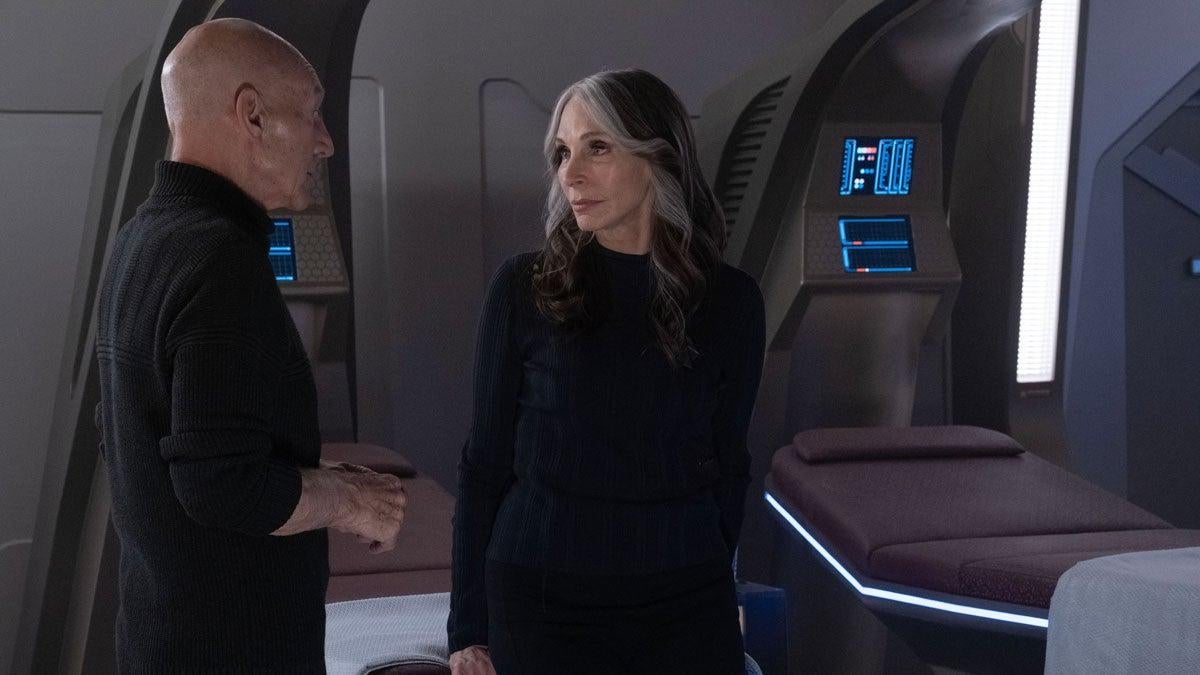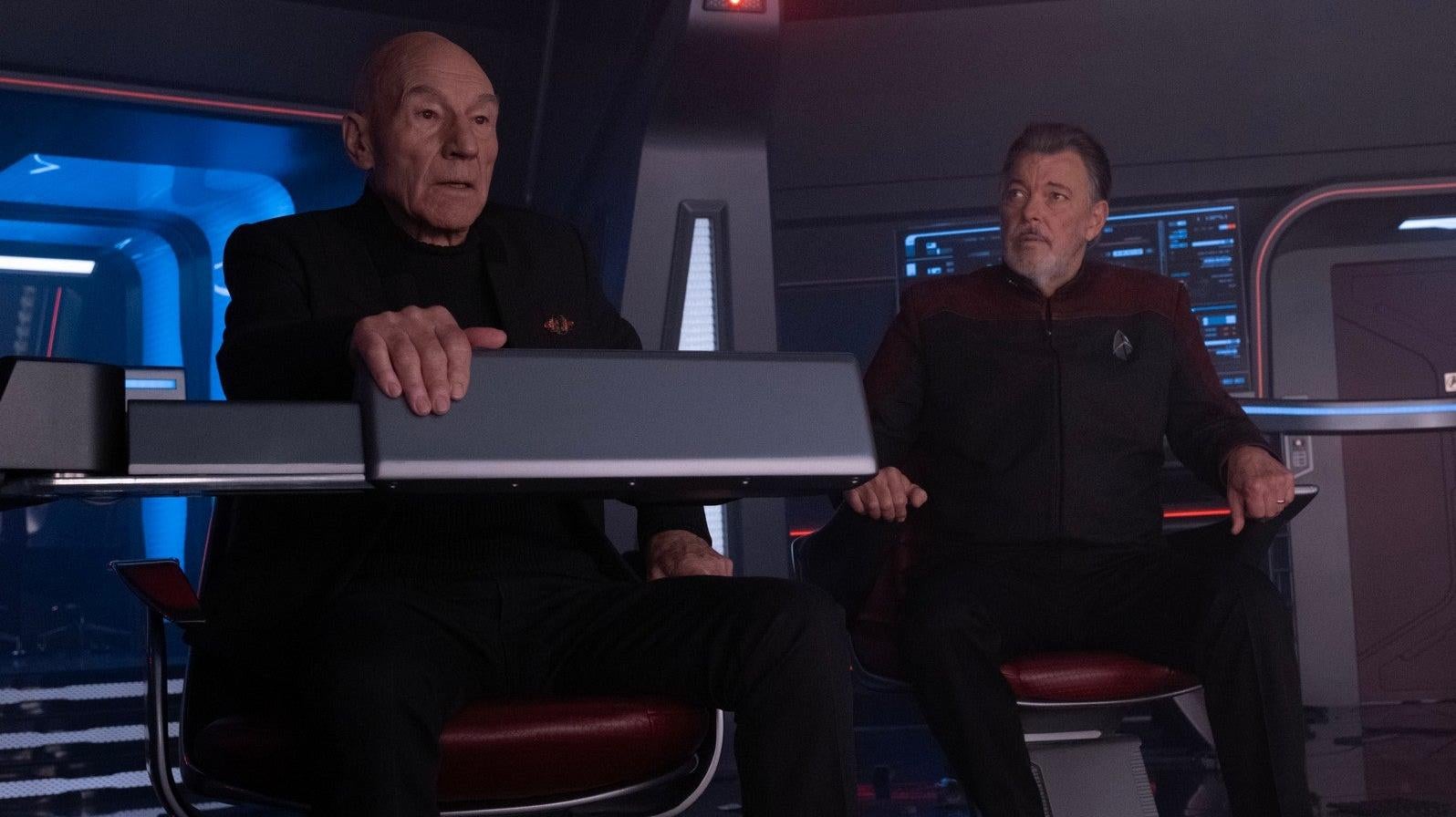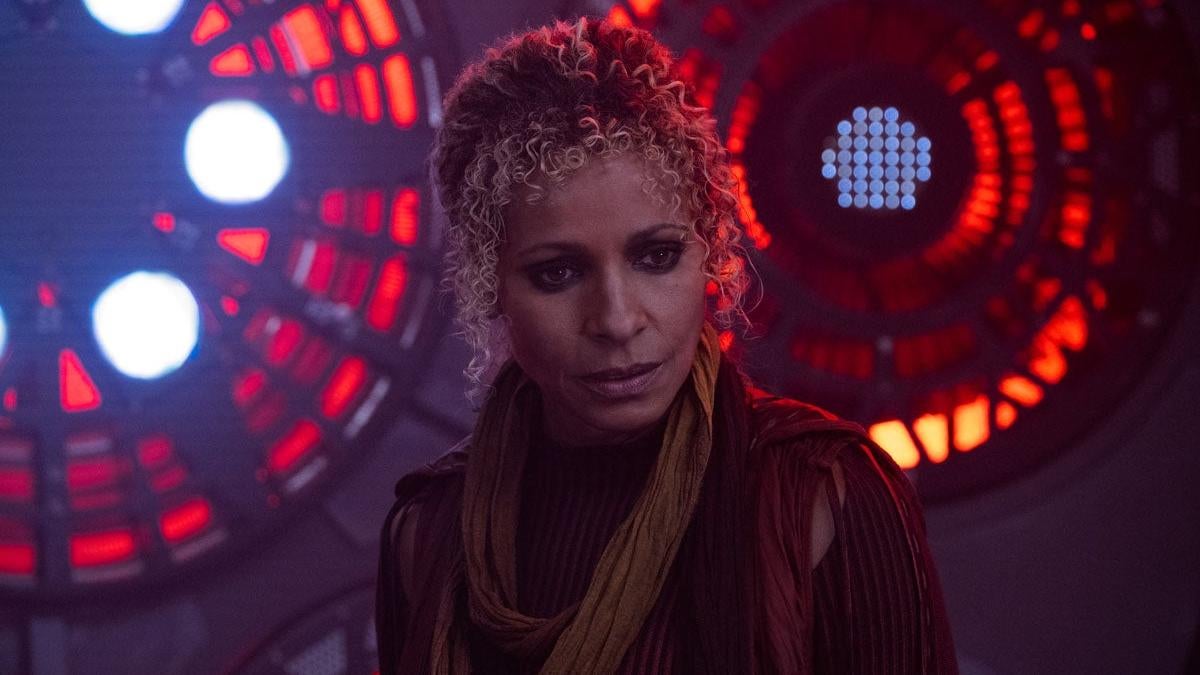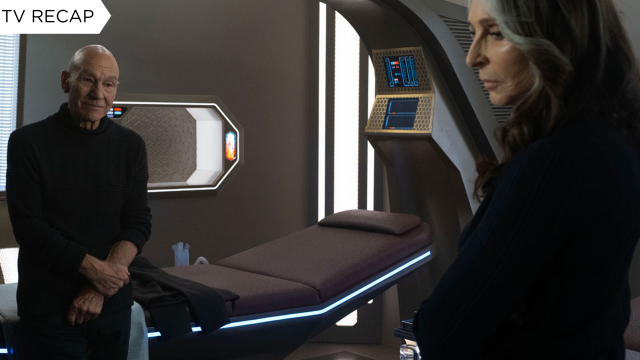Star Trek: Picard season three has so far been, even with the promise of greater stakes to come, something of a relaxing, almost idealistic venture. It’s been about our heroes being the heroes we want them to be, getting things done consequences be damned, about the discovery of legacy, and so on. This week however shows just how easy that facade is to crack.

After last week established that Picard and the crew of the Titan were willing to go to bat against Vadic’s Shrike — in the name of defending his newfound son, Jack — “Seventeen Seconds,” named for the moment of crisis where Riker realised he was about to become a father, is all about testing the bluster of that resolve in some fascinating ways. A pressure cooker of a classic Star Trek premise, as the out-gunned Titan uses a nebula to hide from the overwhelming power of the Shrike, the action delivers great spectacle but more importantly an opportunity to see what happens when all of our old heroes are thrust back into the kind of adventure that filled their daily lives decades ago.
What happens is that, well, none of them handle it well at all. It’s fascinating to see, for what has so far — and even in this moment of tension, still is — been a season that lovingly looks back at the old guard of The Next Generation to have these same idealised, almost deified heroes splinter almost the moment their backs are truly against the wall. Naturally, this starts off with Picard and Beverly getting their first real scenes together this season — and in the wake of the revelation that Jack is indeed their son, it’s a more powerful and damaging moment of fallout than anything Vadic’s fearsome portal-gun can muster.

Patrick Stewart and Gates McFadden given character-defining performances here, as all the pent-up shock and rage from years of not talking to each other comes out in barbs and jabs that are laden with equal parts venom and grief. There are no “winners” in this devastating contest between them. The fear Beverly has is understandable — that she wanted a life for her son, having already essentially lost one in Wesley, where an association with Jean-Luc Picard wouldn’t immediately plant a target on his back. But the grief Jean-Luc has at being denied the chance to see if he could be a father at all is equally heartbreaking. While the dust settles as the two are pulled back into their old roles when Vadic assaults and prods at the Titan, there’s this sense that there’s little in the way of any actual healing starting between the two yet — which is a bold choice to make for what is in effect the first real time Beverly Crusher and Jean-Luc Picard have been on screen together since Nemesis.
The impact of this conflict only shatters Picard even more, and at the worst possible time. When a strike on the Titan knocks Shaw out of commission, he’s begrudgingly forced to hand command over to Riker, and our two friends, so soon after their jocular banter about how everything was just like old times again this season, find that even their bond is not immune to the pressure building around them. It all comes back to that 17 seconds Riker notes to Picard early on — the moment in the chaos where a person decides to step up to put their life on the line for another human being, whether it’s a son or the extended family of 500 people aboard a starship nearly dead in the water. Although at first their disagreements almost have a sense of playfulness — Picard wanting direct action like the hero he’s meant to be, Riker wanting the safest way to not just get himself back home to Deanna, but to get the Titan’s crew back to their own families as well — the more the pressure of the Nebula and the threat of Vadic bears down upon them, the quicker things turn into a verbal slugfest between the two.

It’s ugly, and far more tense than anything the Shrike could muster against the ship, because it shows how much the passage of time has really weighed on these two characters. Riker isn’t the the swaggering hero he was as Number One (or the jazz-loving captain of the Titan as seen on Lower Decks) any more, he’s a family man with his own priorities and years of trauma from that life after the death of his son. Picard, so blindsided by the revelation of Jack’s existence, retreats wholly into the recklessly heroic persona his legacy has made for him, equally blinding him in turn that they cannot match Vadic’s power punch-for-punch. It’s a powder keg of a situation just waiting for the spark, and when that spark comes as Riker lets Picard get enough rope to hang himself, staging an all-out attack on the Shrike that fails spectacularly with the revelation of the ship’s portal weapon, Riker loses it.
He doesn’t just question Picard’s tactical acumen, it’s a dressing down unlike anything Jean-Luc has faced in ages, as Riker practically screams at his best friend that he’s just doomed them all to death. If Picard’s conflict with Beverly in the opening of the episode was to strip down and expose the internal, emotional layers of Jean-Luc, this conflict arguably wounds him even more, as it strips down and exposes the mythos of the great Captain Picard. And with both halves of him wounded like this, just who can Jean-Luc Picard even be to anyone? He’s not yet the father his son needed, he is not the hero the Titan needs to get out of Vadic’s trap alive, and to two of his closest friends, he is now this shattering disappointment. In its first two seasons Star Trek: Picard tried and failed to really engage with critiquing the legend around its titular character, never having enough bite to its barks when it mattered most. In hindsight, it almost seems that the series was waiting for this moment — when it could deploy the people in Picard’s life who could hurt him the most to fail — for it to finally hit home. Although we know that — this early on in the season — things are probably going to pan out ok for the Titan and her crew, Jean-Luc included, “Seventeen Seconds” still has that bite to show that Picard, for all his beliefs to the contrary sometimes, is deeply human, and can make mistakes as devastatingly as any of us can.

And honestly, it’s probably for the best that he’s making them now before things get worse. Away from the high drama aboard the Titan, Worf and Raffi’s subplot kicks into high gear as they narrow down the connections to the terror attack that destroyed the Starfleet recruitment station — and in doing so uncover that the threat is far more familiar than anyone thought. Yes, the portal weapon was a distraction from whatever was really stolen at Daystrom, but who’s doing it is the big shock. Raffi and Worf’s captive criminal melts and morphs to reveal that they are none other than a Changeling, from a rogue faction that has severed itself from the wider Great Link after the Dominion War to seek vengeance against the Federation.
The Dominion War brought out the darkest side of Starfleet in ways that such a resurgence could do so again — a fascinating promise, considering what the rest of this episode does to expose Picard’s own personal mythos. We’ll have to wait and see where this all goes, but for now, Picard’s third season is so far proving to have the bite its predecessors rarely had, even as it goes all in on its Star Trek links and throwbacks.
